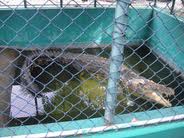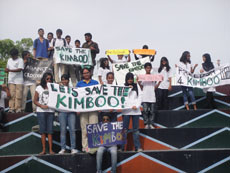The World Society for the Protection of Animals (WSPA) has stated that the cage used to house a crocodile in Male’ is “entirely inadequate” for an animal of its size.
Locally known as ‘Kinboo’, the crocodile was first captured back in 1998 and was subsequently caged inside a children’s play park for public entertainment.
For the last three years, the animal’s poor living conditions have caught the attention of the media, even sparking a campaign from a local school to save the animal, however nothing has yet been done to resolve the issue.
WSPA’s Wildlife Veterinary Programmes Manager, Dr Jan Schmidt-Burbach told Minivan News in a statement that the WSPA encouraged local efforts being made to relocate the crocodile to a more suitable facility.
“It is important to remember that good animal welfare is not only about the physical health of an animal, but also its mental health. As is the case with humans, the environment that an animal is living in can and does affect its mental health.”
“The ideal environment for a wild animal is its wild habitat. Based on the images I have seen, the enclosure [in Male’] is entirely inadequate to meet the needs of a wild crocodile,” Schmidt-Burbach stated.
According to captive crocodile husbandry guidelines, the wildlife expert stated that the enclosure needs to have both shaded and sunlit areas and should be a minimum of 36 square-metres.
“A majority of the enclosure should be covered in water deep enough for the animal to fully submerge itself. I estimate for this crocodile the pool should be at least one metre deep,” he added.
Cage is far too small: EPA
Director General of the Environmental Protection Agency Ibrahim Naeem made similar recommendations to the WSPA in regard to the crocodile, adding that it needs to be kept in an adequate space and is currently living in cage “far too small” for its size.
“We believe that the Maldives lacks in technical and financial capacity regarding the animals kept in captivity. Though the conditions are like that, we believe that these animals must be treated with care and killing is not an option in any case,” Naeem said.
 Last year, Minivan News reported that the crocodile was forced to curl its tail to fit inside its roofed cage.
Last year, Minivan News reported that the crocodile was forced to curl its tail to fit inside its roofed cage.
Furthermore, the water within the enclosure barely covered the animal’s stomach – an apparent violation of both international and national laws forbidding animal cruelty.
“The 10-foot crocodile in Male’ is living in a far too small cage for it. We believe that the Maldives National Defence Force (MNDF) has conducted enlargements of the cage several times and hope they will continue to do so,” Naeem added.
The EPA’s comments follow news that a smaller crocodile had been captured by MNDF last month at Helengeli Resort.
MNDF Spokesperson Colonel Abdul Raheem told Minivan News on Thursday (March 14) that there had been “talks” to send the animal abroad, but as of yet nothing had happened.
“I don’t think the cage is big enough, but I have no idea if they are going to increase the size of the cage,” Raheem said.
When asked if the EPA believes the MNDF has adequate facilities and knowledge in keeping crocodiles, the agency’s Director General said that it was in “no position to comment on the capacity of MNDF regarding the crocodile issue.”
Mission to save Kinboo
In 2010, a group of children from Billabong High School in Male’ attempted to save Kinboo from captivity.
Roughly 30 students took part in the ‘mission’ after the crocodile’s living conditions were noticed by the school’s biology teacher, Kate Wilson.
Wilson told Minivan News at the time, that she had been “horrified” by the size of the enclosure and enlisted the help from her students to attempt to save the animal.
Despite getting in touch with an international agency in Australia and producing a video calling for support, the crocodile still remains in the cage three years later.
Last year, Defence Minister Mohamed Nazim claimed that the ministry had planned to send Kinboo abroad to a zoo, replacing the large animal with a “small Kinboo” to keep in the cage instead.
According to the minister, a smaller crocodile will be brought to replace the bigger one because a lot of children enjoy watching the creature in its cage.
“It is useful for educating the children. So we are planning to bring a small Kinboo.” he noted. “When it grows big we will send it off abroad again.”
Following the occasional public calls to have the crocodile released, former governments have made similar suggestions about sending the animal overseas, yet none of these plans have transformed into any action.
Regarding this matter, Naeem said that because the animal had grown so large, the expense of moving such a big animal to a nearby country is very high.
“We had discussions to move the crocodile to a zoo in a neighbouring country, but it was later recommended that since the animal is adjusted to such a condition [of the cage] it minimises its chance of survival in its natural habitat,” Naeem claimed.